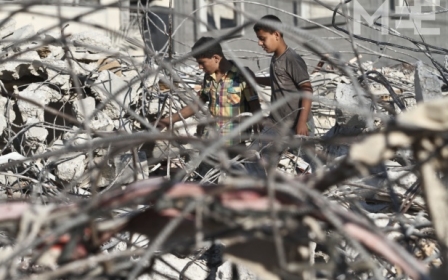Liberal intellectuals ask the wrong questions about jihadist attacks

Much of the writing of prominent Western journalists on the murders carried out by Islamists in France undermines rather than assists efforts to reduce political violence against civilians. Probably the most urgent manifestation of this problem is that, as I have shown, the killings are being used to justify Western-led wars in the Middle East.
However, the commentary offered by high-profile analysts like Jonathan Freedland, Nicholas Kristof and George Packer has other harmful big picture, longer-term implications. These liberal intellectuals frame public debate in ways that impede fruitful conversations. By that I mean discussions that could lead more people in the West to oppose their states’ policies that kill or injure huge numbers of Muslims and that, as Professor Riaz Hassan finds, lead to some Muslims carrying out violent acts whose victims include citizens of Western states or their allies.
Kristof’s article is largely focused on the wrong question. Much of his piece centres on speculating about whether there is an intrinsic relationship between Islam and violence. Ultimately he concludes that there is not. Yet a consequence of selecting those parameters for a discussion about political violence is that questions that could be far more helpful are left unconsidered such as: which power configurations lead the terrorism of Islamists and that of Western states to find expression in the ways they do? How can socio-political arrangements be challenged so as to stop the extreme violence of Western states and their allies as well as the violence enacted by some Muslims that, as the scholars Robert A Pape and James K Feldman show, arises in response?
Making a false connection
Unlike Kristof, Packer is confident that a link exists between Islam and violence. He writes: “Islam today includes a substantial minority of believers who countenance, if they don’t actually carry out, a degree of violence in the application of their convictions that is currently unique.” Yet there is evidence that contradicts Packer’s unsubstantiated claim. For example, a Gallup analysis of more than 130 countries finds that “one’s religious identity and level of devotion have little to do with one’s views about attacking civilians.” The data shows that a greater percentage of people in the largely-Muslim Middle East and North Africa region than anywhere else in the world regard attacks on civilians by either individuals or militaries as never justified.
Meanwhile, Gallup’s analysis shows that “Residents of the US and Canada are the most likely population in the world to believe military attacks targeting civilians are sometimes justified, with nearly half (47 percent) sharing this sentiment.” Thus it would make more sense if Kristof and Packer were to consider if there is an inherent like between violence and North American culture. However, Kristof and Packer are either unwilling to seek or not skilled enough to find that data.
Moreover, Packer contends that the French killings are “the latest blows delivered by an ideology that has sought to achieve power through terror for decades.” Here he makes the old idealist error of assuming that ideology explains the material world rather than the opposite. Instead of casually attributing the killings in France to the abstract beliefs of the murderers, Packer could have used his perch at The New Yorker to explore far more productive issues such as: what is it about the concrete socio-economic circumstances in which many Muslims live that make jihadism a potent political force? Or he could have asked a question that, according to the findings of Hassan and Pape and Feldman, is intimately related: what are the underlying causes of Western states seeking “power through terror” for centuries?
Western violence discounted
Moreover, Packer implies that jihadism is the most harmful form of violence on earth or the only one whose victims really count. When he mentions Western state violence in the Middle East, it is only to dismiss the idea that those policies are connected to the French killings. He waxes indignant about various crimes for which Islamists are responsible but doesn’t offer a word of concern for the West’s victims.
Freedland, similarly, speculates that “Maybe everyone” is experiencing terror “just as they did after 9/11 or 7/7 or Madrid or Bali.” His list of atrocities exclusively consists of jihadist attacks, which suggests that to him only those crimes are so horrible that they must be universally upsetting. In other words, he fails to conceive of how, for example, the routine slaughter of far greater numbers of Palestinians or Iraqis could be seen as at least equally troubling. Since the research of scholars like Hassan and Pape and Feldman finds links between these sites of violence, it’s necessary to discuss and ultimately try to solve these problems in comprehensive, inter-connected ways. But Packer and Freedland fail to do that.
If writers like Freedland, Kristof and Packer wanted to reduce mass murder they could explore possible forms of social, political and economic changes that are needed to address the causes of the multitude of inter-related forms of political violence that take place around the world. But these intellectuals focus only on jihadist crimes and fail to examine them in a larger context. That suggests that their goal is not to end the killing of innocents but to advance imperialist Western state policies.
- Gregory Shupak is an author and activist who teaches media studies at the University of Guelph in Canada.
The views expressed in this article belong to the author and do not necessarily reflect the editorial policy of Middle East Eye.
Photo: Wreckage of a car is seen after a suicide attack affiliated with the Islamic State of Iraq and the Levant outside the Qasr Hotel in Kirkuk, Iraq on January 30 (AA)
Stay informed with MEE's newsletters
Sign up to get the latest alerts, insights and analysis, starting with Turkey Unpacked
Middle East Eye delivers independent and unrivalled coverage and analysis of the Middle East, North Africa and beyond. To learn more about republishing this content and the associated fees, please fill out this form. More about MEE can be found here.





